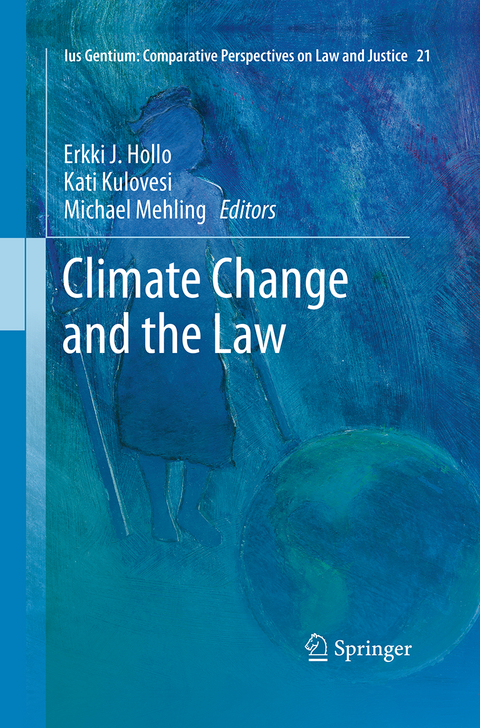
Climate Change and the Law
Springer (Verlag)
978-94-017-7865-7 (ISBN)
In a remarkably short time span, climate change has become deeply embedded in important areas of the law. As a global challenge calling for collective action, climate change has elicited substantial rulemaking at the international plane, percolating through the broader legal system to the regional, national and local levels. More than other areas of law, the normative and practical framework dedicated to climate change has embraced new instruments and softened traditional boundaries between formal and informal, public and private, substantive and procedural; so ubiquitous is the reach of relevant rules nowadays that scholars routinely devote attention to the intersection of climate change and more established fields of legal study, such as international trade law.
Climate Change and the Law explores the rich diversity of international, regional, national, sub-national and transnational legal responses to climate change. Is climate law emerging as a new legal discipline? If so, what shared objectives and concepts define it? How does climate law relate to other areas of law? Such questions lie at the heart of this new book, whose thirty chapters cover doctrinal questions as well as a range of thematic and regional case studies. As Christiana Figueres, Executive Secretary of the United Nations Framework Convention on Climate Change (UNFCCC), states in her preface, these chapters collectively provide a “review of the emergence of a newdiscipline, its core principles and legal techniques, and its relationship and potential interaction with other disciplines.”
Table of Contents.- Contributors.- Abbreviations.- 1. Introduction: Climate Change and the Law; Erkki J. Hollo, Kati Kulovesi and Michael Mehling.- Part I: Climate Law as an Emerging Discipline.- 2. Implementing Climate Law: Instrument Choice and Interaction; Michael Mehling.- 3. Exploring the Landscape of Climate Law and Scholarship: Two Emerging Trends; Kati Kulovesi.- 4. Climate Change and Justice: Perspectives of Legal Theory; Felix Ekardt.- Part II: International Climate Law.- Section I: Architecture and Institutions.- 5. Foundations of International Climate Law: Objectives, Principles and Methods; Rowena Maguire.- 6. Alternative Venues of Climate Cooperation: An Institutional Perspective; Camilla Bausch and Michael Mehling.- 7. Analyzing Soft Law and Hard Law in Climate Change; Antto Vihma.- 8. Compliance and Enforcement in the Climate Change Regime; Meinhard Doelle.- Section II: Cross-Cutting Issues.- 9. The New Framework for Climate Finance under the United Nations Framework Convention on Climate Change: A Breakthrough or an Empty Promise?; Yulia Yamineva and Kati Kulovesi.- 10. Climate Justice: The Clean Development Mechanism as a Case Study; Tomilola Eni-ibukun.- 11. Legal Aspects of Climate Change Adaptation; Jonathan Verschuuren.- 12. Climate Change and Human Rights; Timo Koivurova, Sébastien Duyck and Leena Heinämäki.- Section III: Sectoral Issues.- 13. Managing the Fragmentation of International Climate Law; Harro van Asselt.- 14. No Need to Reinvent the Wheel for a Human Rights-Based Approach to Tackling Climate Change: The Contribution of International Biodiversity Law; Elisa Morgera.- 15. The Role of REDD in the Harmonization of Overlapping International Obligations; Annalisa Savaresi.- 16. Climate Change and Trade: At the Intersection of Two International Legal Regimes; Kati Kulovesi.- 17. Climate Law and Geoengineering; Ralph Bodle.- Part III: Comparative Climate Law.- 18. Climate Law in the United States: Facing Structural andProcedural Barriers; Michael Mehling and David Frenkil.- 19. Canada and the Kyoto Protocol: An Aesop Fable; Jane Matthews Glenn and Jose Otero.- 20. Climate Law in the European Union: Accidental Success or Deliberate Leadership?; Michael Mehling and Kati Kulovesi.- 21. Climate Law in Germany; Felix Ekardt.- 22. Climate Law in the United Kingdom; Colin T. Reid.- 23. Climate Law and Policy in Russia: A Peasant Needs Thunder to Cross Himself and Wonder; Yulia Yamineva.- 24. Australia: From ‘No Regrets’ to A Clean Energy Future?; Sharon Mascher and David Hodgkinson.- 25. Climate Law and Policy in Japan; Hitomi Kimura.- 26. Sustainable Development and Climate Policy and Law in China; Christopher Tung.- 27. India’s Evolving Climate Change Strategy; Namrata Patodia Rastogi.- 28. Climate Change Responses in South Africa; Ed Couzens and Michael Kidd.- 29. Climate Change Policy and Legislation in Brazil; Haroldo Machado Filho.- 30. Climate Law in Latin American Countries; Soledad Aguilar and Eugenia Recio.
| Erscheinungsdatum | 09.07.2016 |
|---|---|
| Reihe/Serie | Ius Gentium: Comparative Perspectives on Law and Justice ; 21 |
| Zusatzinfo | XXI, 693 p. |
| Verlagsort | Dordrecht |
| Sprache | englisch |
| Maße | 155 x 235 mm |
| Themenwelt | Naturwissenschaften ► Biologie ► Ökologie / Naturschutz |
| Naturwissenschaften ► Geowissenschaften ► Meteorologie / Klimatologie | |
| Naturwissenschaften ► Physik / Astronomie | |
| Recht / Steuern ► Allgemeines / Lexika | |
| Recht / Steuern ► EU / Internationales Recht | |
| Technik ► Elektrotechnik / Energietechnik | |
| Technik ► Umwelttechnik / Biotechnologie | |
| Wirtschaft ► Betriebswirtschaft / Management ► Unternehmensführung / Management | |
| ISBN-10 | 94-017-7865-5 / 9401778655 |
| ISBN-13 | 978-94-017-7865-7 / 9789401778657 |
| Zustand | Neuware |
| Haben Sie eine Frage zum Produkt? |
aus dem Bereich


